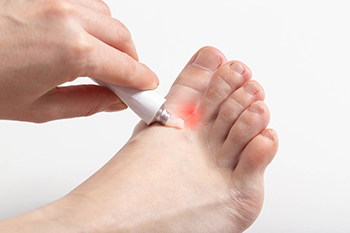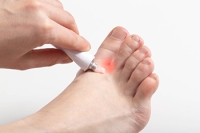
Athlete’s foot, medically known as tinea pedis, is a common and extremely contagious fungal infection that targets the skin on the feet, particularly the spaces between the toes. Among the primary indicators of athlete’s foot is persistent itching and burning sensations experienced between the toes and on the soles of the feet. The discomfort caused by this incessant itching can significantly impact daily activities, leading individuals to find relief through constant scratching or rubbing, which may serve to spread the infection. Redness and inflammation in the affected areas are also signs of athlete's foot. Prolonged exposure to moisture or heat, such as wearing sweaty shoes or walking barefoot in communal areas like public showers or pool areas, tends to exacerbate these symptoms. Peeling and cracking of the skin, especially in areas prone to excessive sweating or friction, are common occurrences in athlete’s foot. The skin may take on a dry, flaky appearance, resembling sunburn or dry skin, making diagnosis challenging without proper knowledge. In certain cases, athlete’s foot may result in blister formation, particularly when excess moisture is trapped within shoes or socks. Unlike blisters from other conditions, those caused by athlete's foot are typically smaller and may contain clear fluid or pus. It is vital not to pop these blisters, as doing so can increase the risk of infection. For help in managing the effects of athlete’s foot, it is suggested that you make an appointment with a podiatrist.
Athlete’s foot is an inconvenient condition that can be easily reduced with the proper treatment. If you have any concerns about your feet and ankles, contact Dr. Kenneth Donovan from Advanced Care Foot and Ankle. Our doctor will treat your foot and ankle needs.
Athlete’s Foot: The Sole Story
Athlete's foot, also known as tinea pedis, can be an extremely contagious foot infection. It is commonly contracted in public changing areas and bathrooms, dormitory style living quarters, around locker rooms and public swimming pools, or anywhere your feet often come into contact with other people.
Solutions to Combat Athlete’s Foot
- Hydrate your feet by using lotion
- Exfoliate
- Buff off nails
- Use of anti-fungal products
- Examine your feet and visit your doctor if any suspicious blisters or cuts develop
Athlete’s foot can cause many irritating symptoms such as dry and flaking skin, itching, and redness. Some more severe symptoms can include bleeding and cracked skin, intense itching and burning, and even pain when walking. In the worst cases, Athlete’s foot can cause blistering as well. Speak to your podiatrist for a better understanding of the different causes of Athlete’s foot, as well as help in determining which treatment options are best for you.
If you have any questions please feel free to contact one of our offices located in Warren, Livingston, and Toms River, NJ . We offer the newest diagnostic and treatment technologies for all your foot and ankle needs.

